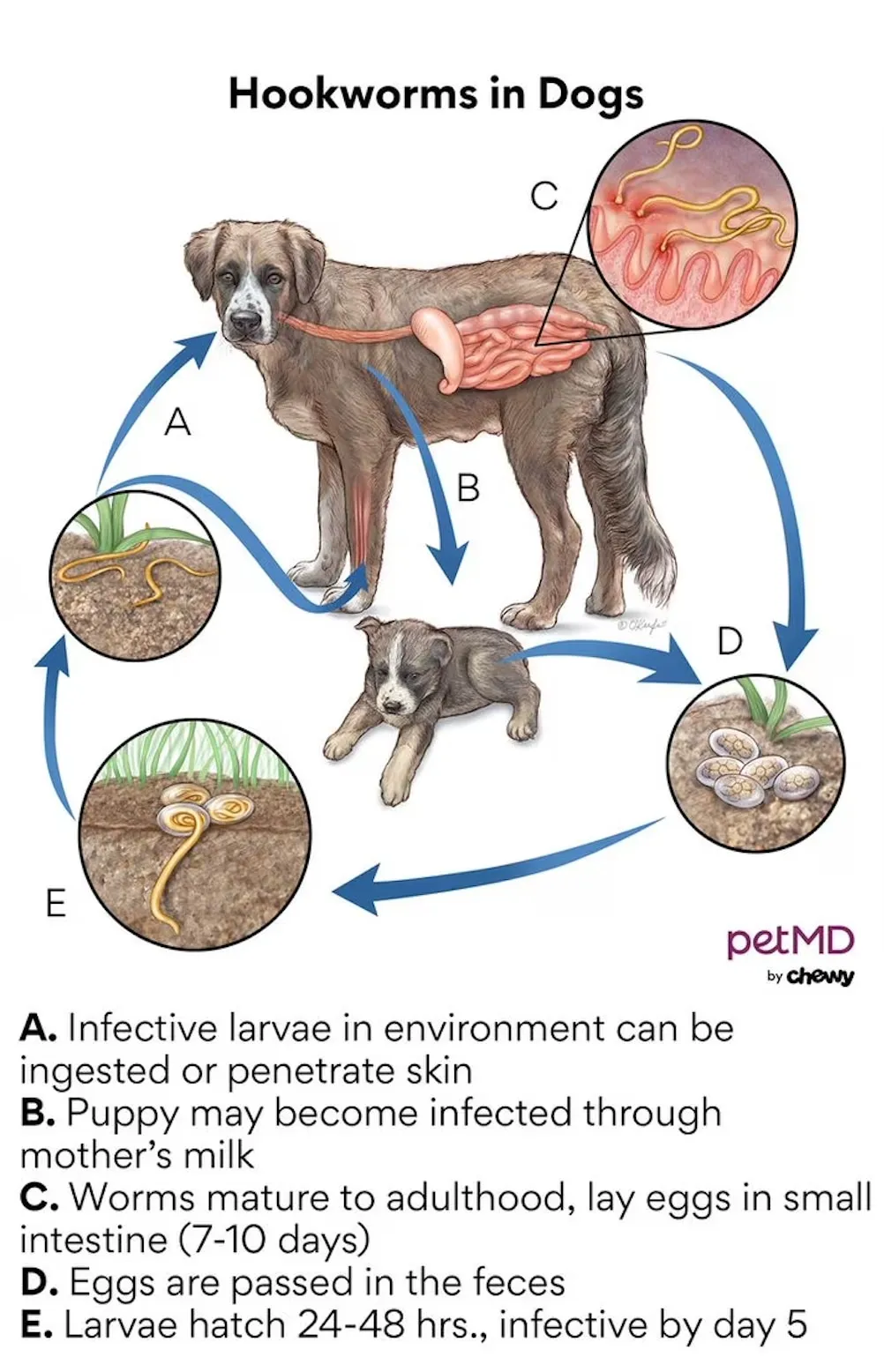Hookworms are a common intestinal parasite in dogs, especially puppies. While treatment is generally effective, it’s essential to be aware of the potential side effects of hookworm medicine. This article will guide you through what to expect, how to manage any adverse reactions, and how to ensure your dog’s recovery.
 A diagram of the process of hookworms in dogs.
A diagram of the process of hookworms in dogs.
What are Hookworms and Why Treat Them?
Hookworms are small parasites that attach to the lining of a dog’s small intestine and feed on blood. The most common type affecting dogs is Ancylostoma. They are typically about 1/8 inch long and often go undetected in stool samples. Left untreated, hookworm infections can lead to:
- Anemia (low red blood cell count)
- Weight loss and poor body condition
- Diarrhea
- General weakness, especially in puppies
Prompt treatment is critical, especially for puppies, as severe hookworm infestations can be fatal due to significant blood loss and malnutrition.
Common Hookworm Medications for Dogs
Veterinarians typically prescribe deworming medications containing ingredients like:
- Pyrantel pamoate: A widely used anthelmintic that paralyzes the hookworms, allowing them to be expelled from the body.
- Fenbendazole: A broad-spectrum dewormer effective against various intestinal parasites, including hookworms.
- Milbemycin oxime: Often combined with other medications in heartworm preventatives and also effective against hookworms.
These medications are usually administered orally, either as a liquid or tablet. The specific medication, dosage, and treatment schedule will depend on the severity of the infection, the dog’s overall health, and the veterinarian’s recommendation.
Potential Side Effects of Hookworm Medicine
While generally safe, deworming medications can sometimes cause side effects in dogs. These side effects are usually mild and temporary, but it’s important to be aware of them.
Common Side Effects
- Vomiting: This is one of the most frequently reported side effects. The medication can irritate the stomach lining, leading to nausea and vomiting.
- Diarrhea: Dewormers can disrupt the normal gut flora, resulting in loose stools or diarrhea.
- Loss of Appetite: Some dogs may experience a temporary decrease in appetite after taking the medication.
- Lethargy: Your dog might seem tired or less energetic than usual.
- Increased Salivation: Some medications can cause excessive drooling.
Less Common, but More Serious Side Effects
Although rare, more severe side effects can occur:
- Allergic Reactions: Signs include facial swelling, hives, difficulty breathing, or collapse. This requires immediate veterinary attention.
- Neurological Signs: In very rare cases, some dogs may exhibit neurological symptoms such as tremors, seizures, or incoordination.
- Liver or Kidney Issues: While uncommon, certain dewormers can potentially affect liver or kidney function, particularly in dogs with pre-existing conditions.
Managing Side Effects of Hookworm Medicine
Here’s how to manage the common side effects and when to seek veterinary care:
For Vomiting and Diarrhea:
- Withhold food for a few hours: Give your dog’s stomach a rest.
- Offer small amounts of bland food: Boiled chicken and rice are gentle on the digestive system.
- Ensure access to fresh water: Prevent dehydration.
- Probiotics: Consider giving your dog a probiotic supplement to help restore the gut flora.
For Loss of Appetite:
- Offer enticing food: Try warming up the food or adding a small amount of low-sodium broth to make it more appealing.
- Hand-feed: Sometimes, gentle encouragement is all it takes.
For Lethargy:
- Provide a quiet, comfortable space: Let your dog rest and recover.
- Avoid strenuous activity: Limit exercise until your dog is back to normal.
When to Contact Your Veterinarian:
- Severe Vomiting or Diarrhea: If your dog can’t keep down water or the diarrhea is bloody or persistent.
- Signs of an Allergic Reaction: Facial swelling, hives, difficulty breathing.
- Neurological Signs: Tremors, seizures, incoordination.
- Prolonged Loss of Appetite or Lethargy: If your dog’s appetite doesn’t return or lethargy persists for more than 24 hours.
- Any Other Concerning Symptoms: Trust your instincts and contact your vet if anything seems unusual.
Tips for a Smooth Recovery
Here are some tips to help your dog recover quickly and comfortably after hookworm treatment:
- Follow Your Veterinarian’s Instructions: Administer the medication exactly as prescribed and complete the entire course of treatment.
- Provide a Nutritious Diet: Feed your dog a high-quality diet to support their immune system and overall health.
- Keep Your Dog Hydrated: Ensure access to fresh, clean water at all times.
- Practice Good Hygiene: Promptly remove and dispose of your dog’s stool to prevent reinfection and environmental contamination.
- Regular Deworming: Implement a regular deworming schedule as recommended by your veterinarian.
- Monthly Parasite Prevention: Use a monthly parasite preventative that includes protection against hookworms.
Prevention is Key
Preventing hookworm infection is always better than treating it. Here are some effective preventive measures:
- Regular Fecal Exams: Have your dog’s stool tested regularly (twice a year for adult dogs, four times a year for puppies) to detect any parasites early.
- Prompt Stool Removal: Always clean up after your dog, especially in public areas.
- Maintain a Clean Environment: Keep your yard clean and free of feces.
- Avoid Contaminated Areas: Be cautious when walking your dog in areas where other dogs frequent, such as dog parks.
- Year-Round Parasite Prevention: Use a monthly parasite preventative medication that protects against hookworms.
Conclusion
Treating hookworms in dogs is crucial for their health and well-being. While hookworm medications are generally safe, being aware of the potential side effects and knowing how to manage them can help ensure a smooth recovery for your furry friend. Always consult with your veterinarian for personalized advice and treatment options. By taking preventive measures and staying informed, you can protect your dog from hookworm infections and keep them happy and healthy.
